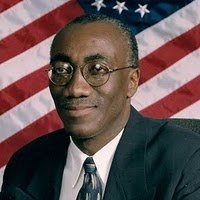By Reynold N Mason JD
John Thompson spent 18 years in prison, 14 of those on death row, for a crime he did not commit. His horrific nightmare began in December 1984 when prominent New Orleans businessman Raymond T. Liuzza, Jr. was killed outside his home. The Orleans Parish District Attorney’s office, then headed by Harry Connick Sr., was under considerable pressure to solve the crime and bring its perpetrator to justice. In the heat of the Liuzza investigation, Jay La Grade and his two siblings faced down an armed robber who also wanted their car. In the struggle, the robber was injured and he fled leaving his blood on one of the victim’s pants. The DA had the blood tested. Tthe lab found it to be type B. Thompson had type O blood.
Shortly after the attempted robbery Thompson and a co-defendant named Kevin Freeman were arrested for the Liuzza murder. La Grade’s father saw Thompson and Freeman’s photographs in the local newspaper and figured they were probably the individuals who had tried to rob his children. He contacted the DA’s office about his suspicions, which led to Thompson and Freeman being charged with armed robbery. The DA’s office removed the lab report from the court file and concealed it from Thompson’s attorney. Thompson was convicted and sentenced to 49 1/2 years for the armed robbery. Three weeks later he was put on trial for the Liuzza murder.
There was just one eyewitness to the shooting and he came forward only after the Liuzza’s offered a reward. He described the shooter as a 6 foot tall, African-American, with a close haircut. Thompson was 5ft. 8 and had an afro. Thompson’s co-defendant in the armed robbery, Kevin Freeman, was 6 feet tall and was known as Kodak because he kept his head shaved. He fit the eyewitness description in both height and hair style. He was the prosecution’s star witness. Thompson was convicted of murder and sentenced to death.
In 1999, after 18 years in prison and with his execution day approaching, one of Thompson’s attorneys discovered the lab report, the eye witness description of the shooter and a treasure trove of other hidden evidence, all exonerating Thompson. His guilty verdict was tossed out, but the DA retried him. The jury deliberated for 35 minutes and found him not guilty. He sued and won an award of $14 million, $1million for each year on death row. But DA, Harry Connick Sr. appealed and the US Supreme court threw out the verdict leaving him without one dime for the harm done him by the roguery of the prosecutor’s office in the name of the people of New Orleans. Why?
Citizens like Thompson, who are harmed by the misconduct of public officials, can sue the city or state for damages under section 1983 of the United States Code. No one will argue that what happened to Thompson, happened because of the misconduct on the part of the prosecutor’s office. Moreover, the prosecutor’s office is required by law to turnover all evidence favorable to a defendant to his lawyers. Four of the nine justices on the Supreme court felt that the DA’s misconduct in this case was enough to entitle Thompson the keep his $14 million award. But the majority thought otherwise. Justice Thomas, who wrote the decision for the majority said that the DA’s office is not liable for a single instance of failure to disclose evidence, even where, as in this instance, it resulted in grievous injury to an innocent man. Public officials are immune from liability when performing their official public duties. To overcome this, one suing a public official, as Thompson did here, because of failure to train prosecutors, must show that the prosecutor showed deliberate indifference to the need to properly train his assistants and that the lack of training was the actual cause of the failure to disclose the favorable evidence.
To satisfy this legal requirement it must be shown that the failure to properly train the prosecutors in this case amounted to deliberate indifference to Thompson’s rights. This means that there had to be proof that the Prosecutor’s office disregarded a known and obvious consequence of his failure to properly train his prosecutors. And to demonstrate this it was necessary for Thompson to show a pattern of deliberate indifference. The four instances of this DA’s office concealing evidence in the ten years prior to Thompson’s case was insufficient to meet this burden. It was not enough to put the DA’s office on notice, since none of them involved scientific evidence.
The court pointed out that legal training is what distinguishes a lawyer from the average public citizen. Attorneys are trained in law and are equipped with tools to interpret and apply legal principles, understand limits and exercise judgment; they must study ethics, pass a bar examination and take continuing education courses designed to reinforce professional standards. The DA is entitled to rely on his prosecutors training and ethical obligations unless there is a specific reason to believe otherwise, such as a pattern of violations, that those tools are inadequate in the usual and recurring situations with which prosecutors must deal. Proving that what happened to Thompson could have been avoided if prosecutors had better training is not enough. The withholding of evidence here was not caused by failure to properly train prosecutors, but by a single miscreant prosecutor’s willful suppression of evidence in an effort to railroad Thompson. This was a knowing, bad faith violation by a prosecutor and, it could not be attributed to lack of training. Holding the DA’s office responsible would make him liable every misdeed of each one of his assistants even when they knew the law forbade the misconduct and they willfully concealed evidence of a defendant’s innocence.

